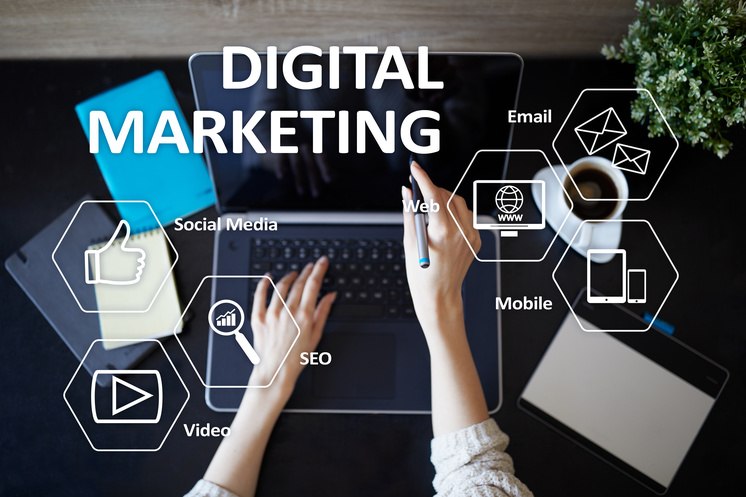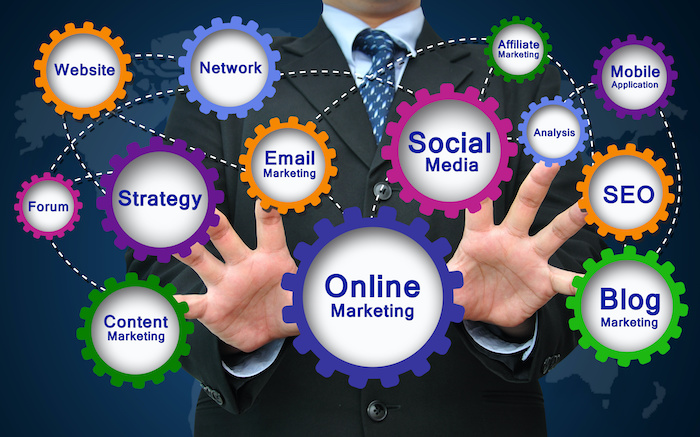Marketing a Business Online
In today’s digital landscape, marketing a business online is crucial for success. Whether you’re a startup or an established company, online marketing helps you reach a broader audience, engage customers, and drive sales. With the right strategies, you can build a strong online presence that boosts brand awareness and revenue. This guide explores the most effective ways to market your business online in 2024.
1. Search Engine Optimization (SEO)
SEO is one of the most important aspects of online marketing. It involves optimizing your website to rank higher on search engine results pages (SERPs) for relevant keywords. Higher rankings mean more visibility and organic traffic, which can lead to more sales or inquiries.
Key SEO Strategies:
- Keyword Research: Use tools like Google Keyword Planner or SEMrush to find relevant, high-volume keywords for your niche.
- On-Page Optimization: Optimize your website’s meta titles, descriptions, headers, and images for keywords.
- Content Creation: Publish high-quality, informative content that addresses your audience’s pain points and answers their questions.
- Backlinks: Build authoritative backlinks from reputable sites to improve your domain authority and search engine rankings.
SEO is a long-term investment, but it delivers sustainable results if executed well.
2. Social Media Marketing
Social media platforms like Facebook, Instagram, LinkedIn, Twitter, and TikTok are powerful tools for online business marketing. These platforms allow you to engage with your audience, promote your products, and grow brand awareness.

Social Media Marketing Tips:
- Choose the Right Platforms: Not all social platforms are suited to every business. For instance, Instagram and TikTok are great for visual content, while LinkedIn works better for B2B marketing.
- Consistent Posting: Share engaging content regularly to keep your audience interested. Use social media scheduling tools like Hootsuite or Buffer to automate your posts.
- Engage with Your Audience: Respond to comments, answer questions, and join discussions to foster a community around your brand.
- Leverage Influencers: Collaborate with influencers who align with your brand to reach a wider audience.
Social media marketing allows you to build a loyal customer base and stay top of mind with potential clients.
3. Content Marketing
Content marketing is about creating valuable, relevant, and consistent content to attract and engage your target audience. Also, content can be in the form of blogs, videos, infographics, eBooks, and podcasts.
Banner Creation and Online Entertainment
CrearBanner.com appears to be a resource for creating online banners. After designing your perfect banner, you might want to explore the world of Learn more for some entertainment.
Effective Content Marketing Strategies:
- Blogging: Create blog posts that address common customer pain points, industry trends, or how-to guides. These can help establish your business as a thought leader in your field.
- Video Content: Video marketing is highly effective, as it captures attention quickly. Create product demos, behind-the-scenes videos, or customer testimonials to boost engagement.
- Email Newsletters: Use email newsletters to share your latest blog posts, company updates, or exclusive offers with your subscribers.
- Repurpose Content: Turn blogs into videos, podcasts, or infographics to reach different audiences across platforms.
Content marketing builds trust and authority, which can lead to higher conversion rates.
4. Email Marketing
Despite the rise of social media, email marketing remains one of the most effective online marketing strategies. Emails allow you to nurture leads, build relationships, and drive repeat business by staying connected with your audience.
Design Smarter, Engage Better
CrearBanner empowers users to craft visually striking banners and graphics that elevate any digital presence. Great design draws attention, but smart content keeps it—just like effective promotions in other digital spaces. For those exploring online entertainment, the safespin casino bonus australia offers an engaging way to experience top-tier casino action with real value. Creativity and opportunity go hand in hand across today’s digital landscape.
Best Practices for Email Marketing:
- Segment Your Email List: Group subscribers by their behavior or preferences to send them more targeted and relevant emails.
- Personalize Emails: Use personalized subject lines, offers, and content based on the recipient’s preferences and actions.
- Automate Campaigns: Use tools like Mailchimp or HubSpot to set up automated email sequences for welcome emails, abandoned cart follow-ups, or special promotions.
- Monitor Performance: Track open rates, click-through rates, and conversions to measure the effectiveness of your campaigns and make data-driven adjustments.
Email marketing can significantly boost customer retention and brand loyalty if done right.
Exploring Crear Banner and Online Entertainment
CrearBanner.com appears to be a website offering tools or services for creating online banners and advertisements. While focusing on your digital marketing efforts and designing eye-catching visuals here in Harare, you might also be interested in exploring online entertainment during your leisure time. For those seeking engaging digital experiences, you can discover more at stellarspins online casino. We encourage responsible engagement with all online activities, balancing your professional pursuits with mindful online leisure.
5. Paid Advertising (PPC)
Pay-Per-Click (PPC) advertising allows businesses to appear at the top of search engine results or on social media platforms through paid campaigns. PPC campaigns, such as Google Ads or Facebook Ads, can deliver immediate results and are ideal for businesses looking to drive traffic quickly.
Steps for a Successful PPC Campaign:
- Set Clear Goals: Define your objectives, whether it’s generating leads, driving traffic, or increasing sales.
- Target the Right Audience: Use demographic, geographic, and interest-based targeting to reach the right people.
- Craft Compelling Ads: Your ad copy and visuals should be engaging and clearly convey the value of your product or service.
- Track and Optimize: Use analytics to measure the performance of your ads and make necessary adjustments to improve ROI.
While PPC requires an ongoing budget, it delivers instant visibility and can complement your organic marketing efforts.
6. Influencer and Affiliate Marketing
Influencer marketing involves partnering with popular individuals in your niche who can promote your products or services to their audience. Meanwhile, affiliate marketing lets others earn commissions by promoting your products through their blogs, websites, or social media channels.
Tips for Success:
- Choose the Right Influencers: Work with influencers whose audience aligns with your target demographic.
- Offer Incentives: Provide exclusive discounts or special offers that influencers or affiliates can promote to their followers.
- Track Performance: Use unique affiliate links or discount codes to track the success of each influencer or affiliate campaign.
Both influencer and affiliate marketing allow you to reach new audiences and build credibility through trusted voices.
From Design to Digital Entertainment
CrearBanner.com focuses on creating impactful visual designs, highlighting the creative and engaging aspects of the digital realm. Beyond crafting compelling banners, the online world also offers a wide array of entertainment options. For those interested in interactive and potentially rewarding digital experiences, exploring platforms among real money casinos online can provide a different kind of creative outlet. Always remember to engage responsibly and enjoy the diverse facets of the digital landscape.
Enhance Your Creative Break with Bonus Perks
At CrearBanner, creativity meets opportunity—even off the canvas. Discover how no deposit bonuses let you enjoy top casino games without spending a cent, a smart pause during your design workflow. Seamlessly blend inspiration with low‑risk entertainment without skipping a beat.
Conclusion
Marketing your business online in 2024 requires a multi-faceted approach that includes SEO, social media, content marketing, email campaigns, and paid advertising. By leveraging these strategies, you can build brand awareness, engage your audience, and drive growth for your business. Remember to monitor your campaigns closely, adjust your strategies based on performance data, and stay up to date with digital marketing trends to maintain a competitive edge.



